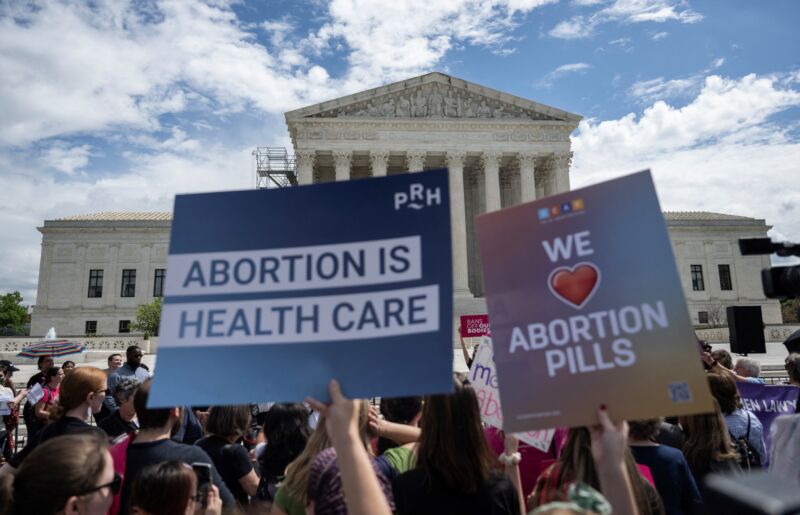
Update 4/19/2023 3:58 pm ET: Supreme Court Justice Samuel Alito extended the temporary stay on the lower court’s order. It is now stayed until midnight on Friday, April 21, 2023. The stay preserves the status quo access to the abortion and miscarriage drug mifepristone for two more days.
Original story 4/18/2023 11:09 pm ET: The US Supreme Court may soon issue a ruling in a high-stakes case that will determine not only the national availability of the safe and effective abortion and miscarriage medication mifepristone but also the fate of the Food and Drug Administration’s overall authority to regulate the country’s drugs.
In case you haven’t been following along, here’s everything you need to know before the high court makes its next move.
The case: Alliance for Hippocratic Medicine v. FDA
The case began last November in a federal court in Texas when a group of anti-abortion organizations (led by the Alliance for Hippocratic Medicine) filed a lawsuit against the FDA, claiming that the regulator’s approval and regulation of mifepristone was unlawful. As expected, District Judge Matthew Kacsmaryk issued a preliminary injunction on April 7 revoking the FDA’s 2000 approval and ruled that the FDA’s actions between 2016 and 2021, which included easing restrictions on the drug’s use and access, were also unlawful. Kacsmaryk granted a seven-day stay of the order, allowing time for the government to appeal the ruling and seek a longer freeze. Without intervention, mifepristone could have been wrenched from the market nationwide on April 15.
But the case quickly moved to the Court of Appeals for the 5th Circuit in New Orleans, where a panel of three more conservative judges issued an unpublished order on April 12 that only partially upheld Kacsmaryk’s ruling. The panel temporarily blocked Kacsmaryk’s central ruling to revoke the 2000 approval of the drug, but it upheld his rulings on the FDA’s 2016 to 2021 actions. This meant that on April 15, access to mifepristone could be rolled back to its pre-2016 status; it could only be used up to seven weeks into a pregnancy, not 10 weeks, and it could no longer be prescribed via telemedicine or dispensed through the mail, among other restrictions.
The federal government swiftly asked the high court to step in, and late on Friday, April 14, Supreme Court Justice Samuel Alito temporarily stayed the remainder of Kacsmaryk’s order until midnight on Wednesday, preserving full access to mifepristone—for now. The stay gives the Supreme Court time to review the appeals and consider granting a longer stay as the case proceeds, and it may issue another ruling before time is up.
The FDA, former regulators, numerous health and medical organizations, hundreds of biotech executives, a powerful trade group for the pharmaceutical industry (PhRMA), and many legal experts all argue that mifepristone is safe and effective and that the FDA was well within its expertise and authority to approve and regulate the drug as it did. They also argue that Kacsmaryk’s ruling sets a dangerous precedent of allowing an inexpert judge to second-guess the FDA’s scientific and medical expertise. It is the first such case of a district judge vacating an FDA approval based partly on the argument that the FDA got the science wrong, opening the door to judicial activism that could imperil virtually any FDA-approved drug.
As a group of former FDA officials lay out in one of the many amicus briefs filed with the Supreme Court, anti-vaccine advocates could seek to have life-saving vaccines pulled from the market, drug companies could ask a judge to sabotage a rival’s product by revoking approval or restricting use, and jilted pharmaceutical companies that receive an FDA rejection after spending millions on research and development could pursue a second opinion in the courts.
https://arstechnica.com/?p=1932588

